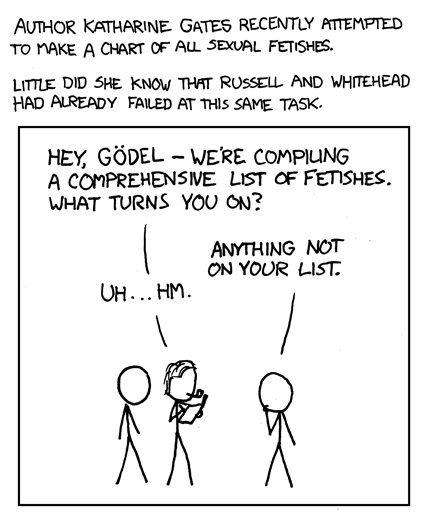I was so ticked by this that I still have the card even though I've changed health insurance plans several times since.
The Barber paradox
Another version of this is the famous Barber paradox:The barber is a man in town who shaves all those, and only those, men in town who do not shave themselves. Who shaves the barber?Whatever answer you give, you arrive at a contradiction. Naive set theory allows you to make such statements that cannot be assigned a truthiness, i.e. a true or false value. My favorite version of this paradox is, of course, the version by xkcd:
 |
| Sexual fetishes and mathematical logic, what's not to like? |
The great logician Friedrich Ludwig Gottlob Frege (say that five times fast) was deep into his project to reduce all of mathematics to logic when Russell wrote to him about the paradox. Russell recalled the interaction thusly:
As I think about acts of integrity and grace, I realise that there is nothing in my knowledge to compare with Frege's dedication to truth. His entire life's work was on the verge of completion, ... his second volume was about to be published, and upon finding that his fundamental assumption was in error, he responded with intellectual pleasure clearly submerging any feelings of personal disappointment. It was almost superhuman and a telling indication of that of which men are capable if their dedication is to creative work and knowledge instead of cruder efforts to dominate and be known.
If only all of us responded so well when our pet theory is stomped by the cruel foot of reality, or irreality in this case.
Russell and Whitehead were also troubled. They sought to re-axiomatize all of set theory to prevent contradictions like these from arising. They hopped to push right up to the line of the paradox without going over. In 1930-1, Kurt Gödel said: "Looking for that line, eh? Look behind you." I only hope that Russell and Whitehead responded as well as Frege when their Jenga pyramid was kicked out from under them.

No comments:
Post a Comment